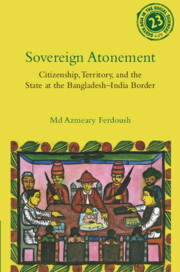Book contents
- Frontmatter
- Contents
- List of figures
- Preface
- Acknowledgments
- Introduction: Remnants, nations, and the sovereign
- 1 Sovereign atonement
- 2 From “sensitive” to “symbolic” spaces
- 3 Land and citizenship as technologies of territory
- 4 Everyday governance: Ambiguity, accountability, and abundance
- 5 Infrastructure, belonging, and the state
- 6 Refusal and tolerance
- Epilogue
- Appendix: A note on methods
- References
- Index
Appendix: A note on methods
Published online by Cambridge University Press: 30 April 2024
- Frontmatter
- Contents
- List of figures
- Preface
- Acknowledgments
- Introduction: Remnants, nations, and the sovereign
- 1 Sovereign atonement
- 2 From “sensitive” to “symbolic” spaces
- 3 Land and citizenship as technologies of territory
- 4 Everyday governance: Ambiguity, accountability, and abundance
- 5 Infrastructure, belonging, and the state
- 6 Refusal and tolerance
- Epilogue
- Appendix: A note on methods
- References
- Index
Summary
Sovereign Atonement builds primarily on ethnographic fieldwork conducted in phases during 2015, 2017, and 2018, supplemented by secondary sources from archives and online platforms. During 2015, I conducted pre-dissertation fieldwork in June and July, when both Bangladesh and India were preparing to exchange the enclaves, and their residents were preparing either to move or to stay. In the span of these two months, I interviewed thirteen enclave residents in four former enclaves under Panchagarh district in Bangladesh. I also interviewed two mid-level state bureaucrats then posted in Panchagarh. This fieldwork phase was crucial to comprehend the preparation of both the Bangladeshi state to exchange the enclaves and the former enclave residents who were preparing either to leave or to stay. This was also the phase when I was able to locate and interview several residents who had decided to opt for Indian citizenship and move to India. I conducted twelve-month ethnographic fieldwork from June 2017 to May 2018 in the newly merged former enclave of Bangladesh, during which I stayed in and around eight of the biggest enclaves across three districts in Bangladesh: Kurigram, Lalmonirhat, and Panchagarh. I also visited numerous other small enclaves all over the region. This period produced fifty-seven in-depth interviews with former enclave residents who became Bangladeshi citizens. I interviewed ten regular Bangladeshi citizens who lived in the vicinity of the former enclaves and saw them before and after the exchange. This phase further involved twenty-two in-depth interviews with government officials at different hierarchies, from the UNO to clerical staff in various state offices. I also conducted six focus group discussions (FGDs). All the interviews were conducted in Bengali, and I transcribed them with the help of my research assistant. The interviews were semi-structured; I used a checklist to guide the conversation. The average interview lasted about 43 minutes. Although most of my participants permitted an audio-recording of the conversation, a few, especially the government officials, did not allow it. In such cases my research assistant, Morshed, and I took meticulous notes. Although I use insights from those interviews, I do not quote them directly anywhere in the book. I spent my downtime and the months of June and July in 2018 conducting archival research in the Central Library of Dhaka University, the Central Public Library in Dhaka, the National Archives of Bangladesh, and the Rangpur Public Library in Bangladesh.
- Type
- Chapter
- Information
- Sovereign AtonementCitizenship, Territory, and the State at the Bangladesh-India Border, pp. 168 - 173Publisher: Cambridge University PressPrint publication year: 2024

